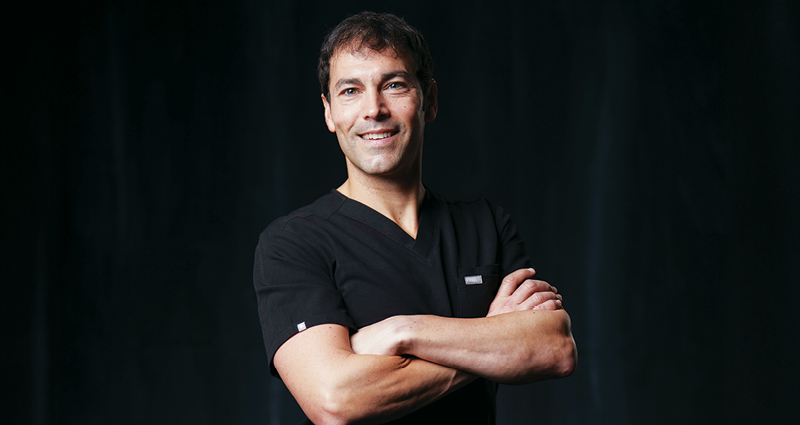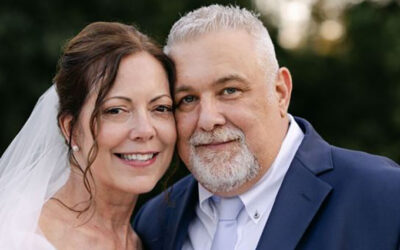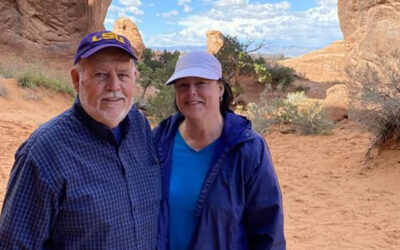When facing an esophageal cancer diagnosis, patients deserve more than hope — they deserve state-of-the-art care, innovative treatments and a dedicated team ready to tackle even the most complex cases.
Nicholas LeBlanc, MD, a thoracic surgeon with Our Lady of the Lake Cancer Institute dedicated to this complex field, shares how his team combines expertise with advanced technology to give patients better outcomes — even in the most challenging cases.
Catching Cancer Early — Why Timing is Everything
Early detection isn’t just important. It can be lifesaving. Dr. LeBlanc explains that the timing of a diagnosis directly impacts a patient’s prognosis. In early-stage esophageal cancer, known as T1a, the risk of cancer spreading to lymph nodes is less than 4%. But once the cancer progresses to T1b, that risk can jump to nearly 40%.
“Being hyper-vigilant, getting scopes, and following up, that’s the difference between life and death,” says Dr. LeBlanc.
For patients with Barrett’s esophagus or other risk factors (chronic reflux or GERD, family history of esophageal cancer, alcohol use, etc), routine screening and follow up EGDs can identify changes before they develop into invasive cancer. If cancer is found early enough, it can often be treated with less invasive procedures, avoiding major surgery.
State-of-the-Art Treatments for Esophageal Cancer
Our Lady of the Lake Cancer Institute offers a range of advanced procedures tailored to each patient’s condition. When dealing with challenging cases, patients need skilled physicians who consistently practice in this area on a daily basis. Dr. LeBlanc and his team specialize in complex cases, using innovative techniques that improve outcomes and quality of life.
Endoscopic Mucosal Resection (EMR), Endoscopic Submucosal Dissection (ESD) and Argon Plasma Coagulation (APC)
When cancer or precancer is caught early, Dr. LeBlanc prefers a less invasive approach called endoscopic mucosal resection (EMR) for small tumors or endoscopic submucosal dissection (ESD) for larger tumors. Using an endoscope, a thin, flexible tube with a camera, the cancerous tissue is removed without the need for traditional surgery. This technique preserves the esophagus and minimizes recovery time. Argon plasma coagulation (APC) is a technique for ablating and treating premalignant conditions, such as Barrett’s esophagus.
Esophageal Stenting
For patients whose tumors block the esophagus or have created communication with nearby structures, eating or drinking may be nearly impossible, and stenting offers a vital solution.
Dr. LeBlanc explains it simply. “Imagine a toilet paper roll (the stent) inside a paper towel roll (the esophagus). We use a scope to place a stent to open the blocked esophagus to allow patients to eat and drink.”
The stent, a hollow tube made of covered mesh, holds the esophagus open, restoring the ability to swallow and bringing immediate relief. While often a last resort for advanced cancer, this procedure provides comfort and helps avoid feeding tubes.
Endovac Therapy
For more complex cases, especially those involving perforations or difficult-to-heal tissue, Dr. LeBlanc uses an innovative approach called endovac therapy.
“It’s a wound vac, but inside the esophagus,” he explains.
This technique involves placing a small sponge connected to a tube through the nose and into the esophagus. The vacuum suction promotes healing by removing fluids and encouraging healthy tissue to grow, a game-changer for patients who would otherwise face severe complications or require major, life-altering surgeries from the damage sustained to their esophagus.
Esophagectomy
When cancer has advanced beyond the earliest stages, surgery is often necessary. An esophagectomy, the removal of part or nearly all the esophagus, can be a lifesaving procedure. Dr. LeBlanc and his team perform minimally invasive esophagectomies when possible, reducing recovery time and post-operative complications.
A Trusted Referral Center for Complex Cases
Dr. LeBlanc and his team have built a reputation for handling the toughest esophageal cases, from perforations to complications arising from prior treatments.
“We’ve become a referral center for the most complex esophageal cases,” he says. “Physicians around the state call us when they need help, and we’re proud to step in.”
This collaboration ensures patients get expert care, even when the situation seems dire. It’s not just about offering advanced treatments. It’s about creating a safety net for patients who need it most.
Hope, Innovation and Expert Care
For patients battling esophageal cancer, whether newly diagnosed or facing complications, Dr. LeBlanc and his team at Our Lady of the Lake Cancer Institute provide more than medical expertise. They offer hope, innovative solutions, and a relentless commitment to better outcomes.
“It’s an honor and privilege to provide care for patients along their cancer journey,” Dr. LeBlanc says.




